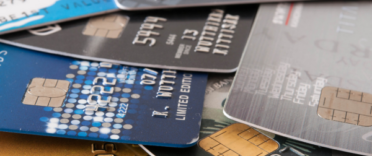
Buy Now, Pay Later credit checks
Buy Now, Pay Later providers will either run a ‘hard’ or ‘soft’ credit check when you sign up. The soft search is the most common option and does not involve an in-depth look at your credit history. It is also less likely to pick up past debt issues.
A hard check is much less common and will leave a mark on your credit record that future prospective lenders can access, allowing them to view where you have previously applied for credit. This means that too many applications in too short a period of time can suggest to lenders that you are desperate for credit and struggling to manage your finances. If you have just been turned down for a credit card or loan, don't rush into applying for any type of credit, especially one that involves a hard check. A credit card application will always require a hard credit check, as it gives a detailed picture of your creditworthiness and affordability.
This all means that if you have had debt issues in the past, you may still be able to use BNPL, even if you cannot get a credit card. However, it is important to remember that BNPL comes with risks. It can be tempting to overspend if you do not have to pay for something upfront. Spending more than you can afford will make the repayments more challenging and increase the risk of missing repayments, which can lead to additional fees and charges.
BNPL firms are required to run an affordability assessment to make sure you can afford the repayments based on your income and outgoings. They must act responsibly when approving users in order to reduce the likelihood of people falling into problem debt. However, you should not wholly rely on this process and instead make sure you feel confident that you can afford to repay what you borrow.
Buy Now, Pay Later with bad credit
You may still be able to use Buy Now, Pay Later if you have bad credit. This is because providers often only run a soft credit check, so your poor credit may not become apparent during the sign-up process. While this is an advantage of choosing BNPL for users with bad credit, it can also be risky. BNPL works best for people who can make the repayments on time and resist overspending.
You may have bad credit because you have missed a repayment in the past. Missing a repayment on a BNPL plan can be very expensive relative to what you have spent. You may need to pay a penalty and could be banned from using that company’s service again in the future.
Conversely, using a BNPL service could help you prove that you have turned a corner and are able to handle your debt responsibly. Past errors are not always an indication of future behaviours, so just because you have missed payments in the past does not mean you should give up on trying to manage your finances responsibly. Borrowing within your means and making regular repayments is a great way to build up your creditworthiness and improve your future borrowing options. BNPL could be one way to do this, but you should also think about other ways to improve your spending behaviour. This could be by making a regular budget, using a credit-builder credit card or improving your credit score.
Keep in mind that some BNPL services will conduct a hard credit check if you are looking to spend a particularly high amount or spread the cost over a lengthy period of time. This would likely lead to someone with bad credit being rejected, but it will ultimately depend on the policies of the particular BNPL company you are using.
Buy Now, Pay Later rules
Since 2022, Buy Now, Pay Later providers have been required to get approval from the FCA (Financial Conduct Authority) in order to operate. This means they must follow certain government regulations, including making sure the debt and repayment plans taken on by users are manageable. This does not mean everyone who uses BNPL will be easily able to repay what they borrow, but it does mean that the providers have to take more care in how it approves its users.
Regulated BNPL schemes are also required to ensure any promotions are not misleading, to avoid consumers taking on debt without an accurate picture of how repayment will work and what it will cost. Anyone who believes they have been misled into using a BNPL scheme, given an unaffordable repayment plan or encouraged to spend more than they can afford to repay is able to complain to the Financial Ombudsman Service.
Does Buy Now, Pay Later affect your credit score?
Using Buy Now, Pay Later will only affect your credit score if the provider shares data with a credit reference agency (CRA). There are three major CRAs in the UK – Experian, Equifax and TransUnion. A CRA will use the available data to build a credit file on you and generate a score that rates your creditworthiness. This means that there are three credit scores that you need to keep track of and the strength of each one will depend on how that CRA operates and what information is available to it.
Most BNPL companies share regular repayment information, while some only do if you consistently miss payments. You can check with your prospective provider before you sign up to find out how they manage your payment data.
The information that is shared will go into your credit file and may affect your credit score. Some data can help your score, for example if you are making all of your payments on time. Other data will hurt your credit score, such as missed payments.
How will Buy Now, Pay Later affect getting a loan or a credit card?
The way in which Buy Now, Pay Later affects a new loan application, credit card, mortgage or any other kind of borrowing in the future will depend on what information the BNPL provider shares with credit reference agencies (CRAs).
If no information is shared with a CRA, then using BNPL should not affect your future borrowing. This means that it should not hamper getting a loan, credit card or mortgage in the future, but conversely, it won't have a positive impact either. Making regular repayments on time is a good habit that you want other lenders to know about, as it makes you appear to be a trustworthy and responsible borrower. It is why it is possible to improve your credit score using a credit card.
If your payment information is shared with a CRA, it could make borrowing in the future easier or more difficult, depending on how you use BNPL. Evidence of you using BNPL without overspending or missing payments could be advantageous, but data showing late payments or high levels of debt will usually make getting a loan or a credit card more difficult.
Pros and cons of Buy Now, Pay Later
Here are the key advantages and disadvantages of using Buy Now, Pay Later:
Pros of Buy Now, Pay Later
- Interest-free short-term credit
- Less intensive application process than for a credit card
- Allows you to spread the cost of purchases that you may not otherwise have been able to afford
- Opportunity to add examples of responsible borrowing to your credit file
Cons of Buy Now, Pay Later
- No protection under section 75 of the Consumer Credit Act
- Missing payments will trigger penalties that are relatively high compared to what you owe
- Can tempt you to overspend
- Can be easy to build up debt
Buy Now, Pay Later alternatives
It is important to properly consider the alternatives before signing up for a Buy Now, Pay Later scheme. Here are some other options to think about:
- Credit cards for bad credit - These credit cards are designed to help you improve your credit as you use them. Usually, there is a low credit limit and high-interest rates, but you can improve your credit score by using it responsibly.
- Personal loans - Some loans are targeted towards people with bad credit, but you should avoid sky-high interest payday loans. A personal loan can be a good option for expensive purchases and long-term borrowing.
- Credit unions - This is a traditional alternative lending option, but only a limited number of people will qualify to take advantage of it. You can find more information in our article ‘What is a credit union?’.
- Improve your credit score - Boosting your credit score will open up more credit options and better alternatives to BNPL. For example, a good credit score will usually mean you can get the top rewards credit cards and 0% purchase credit cards. This means you could spread the cost of your purchases, or earn points or cashback on your spending.



